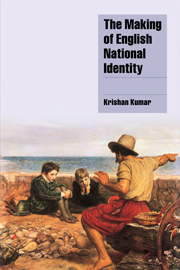Book contents
- Frontmatter
- Contents
- Preface
- 1 English or British? The question of English national identity
- 2 Nations and nationalism: civic, ethnic and imperial
- 3 When was England?
- 4 The first English Empire
- 5 The English nation: parent of nationalism?
- 6 The making of British identity
- 7 The moment of Englishness
- 8 The English and the British today
- Notes
- List of references
- Index
- Cambridge Cultural Social Studies
1 - English or British? The question of English national identity
Published online by Cambridge University Press: 07 December 2009
- Frontmatter
- Contents
- Preface
- 1 English or British? The question of English national identity
- 2 Nations and nationalism: civic, ethnic and imperial
- 3 When was England?
- 4 The first English Empire
- 5 The English nation: parent of nationalism?
- 6 The making of British identity
- 7 The moment of Englishness
- 8 The English and the British today
- Notes
- List of references
- Index
- Cambridge Cultural Social Studies
Summary
I am a citizen of a country with no agreed colloquial name.
Bernard Crick (1991a:90)As long as the various peoples lumped together under the heading “English” accept this, let us use it. When they start to object we call them Irish or even Scotch. It really does not matter. Everyone knows what we mean whether we call our subject English history or British history. It is a fuss over names, not over things.
A. J. P. Taylor (1975:622)It can be said of the English in Britain, as wags say of the Catholics in Heaven, that they think they are the only ones here.
Conrad Russell (1993:3)A natural confusion
‘English, I mean British’ – this familiar locution alerts us immediately to one of the enduring perplexities of English national identity. How to separate ‘English’ from ‘British’? The reverse problem is nowhere as acute. Non-English members of the United Kingdom rarely say ‘British’ when they mean ‘English’, or ‘English’ when they mean ‘British’. On the contrary, they are usually only too jarringly aware of what is peculiarly English, and are highly sensitive to the lordly English habit of subsuming British under English. For them it is a constant reminder of what they perceive to be – rightly, of course, – England's hegemony over the rest of the British Isles.
One has to say immediately though that the problem is not one solely of or for the English.
- Type
- Chapter
- Information
- The Making of English National Identity , pp. 1 - 17Publisher: Cambridge University PressPrint publication year: 2003



